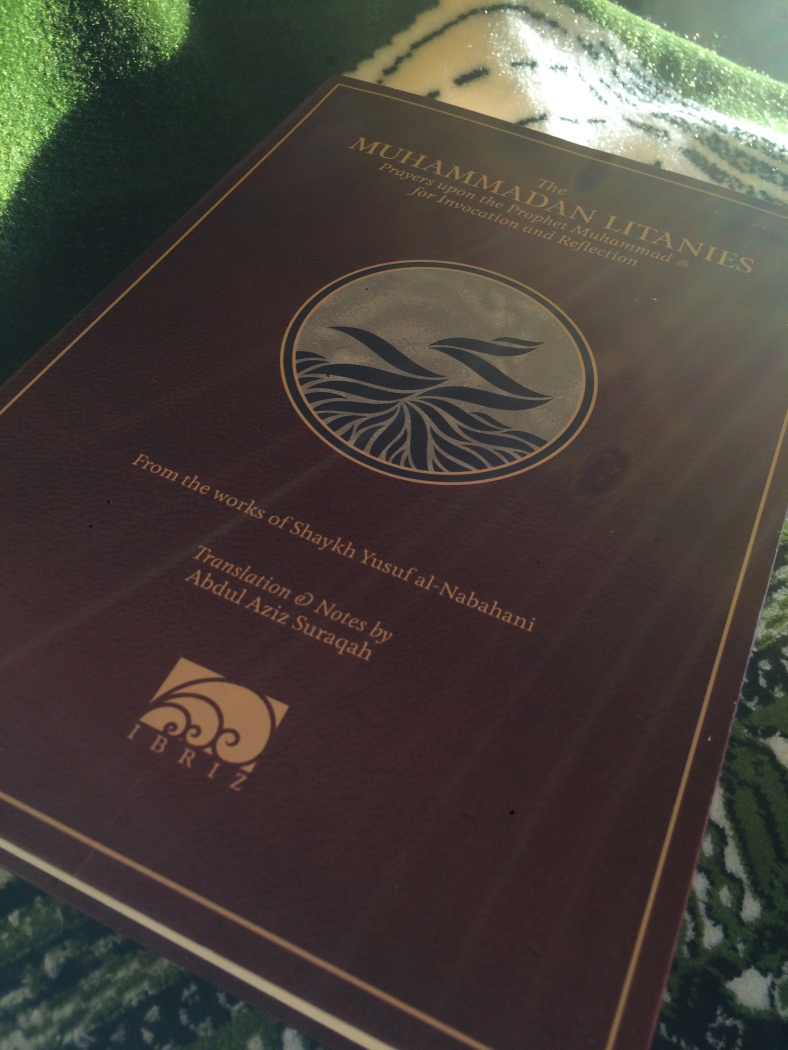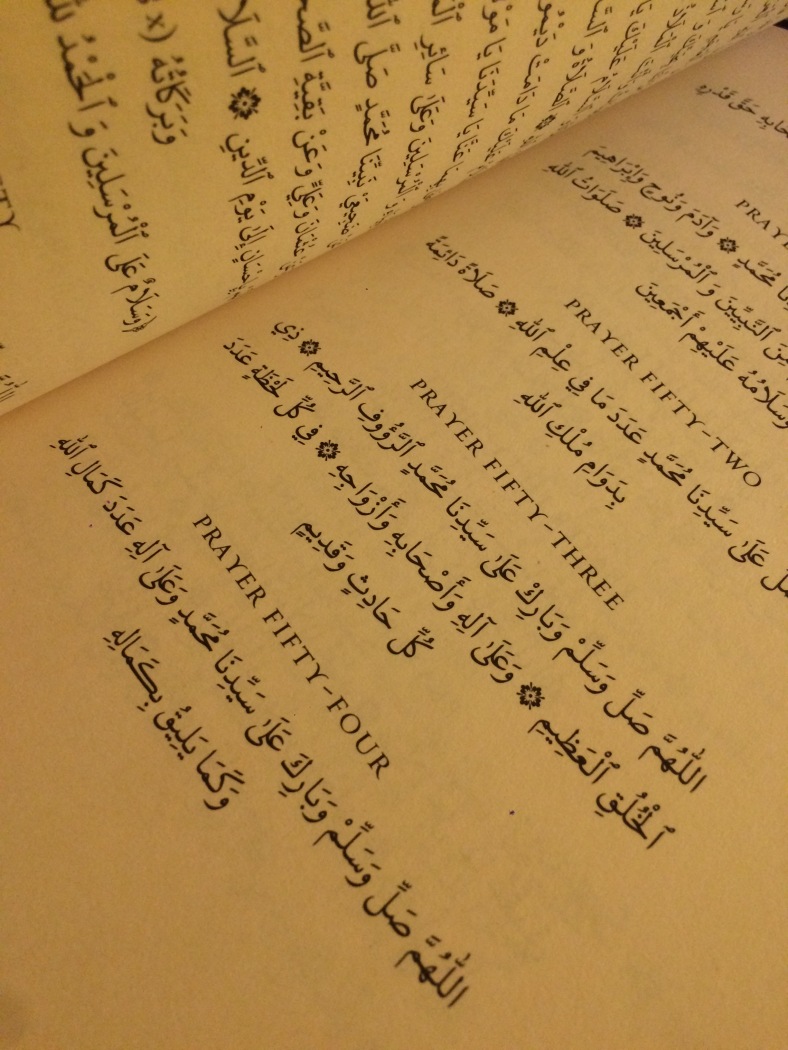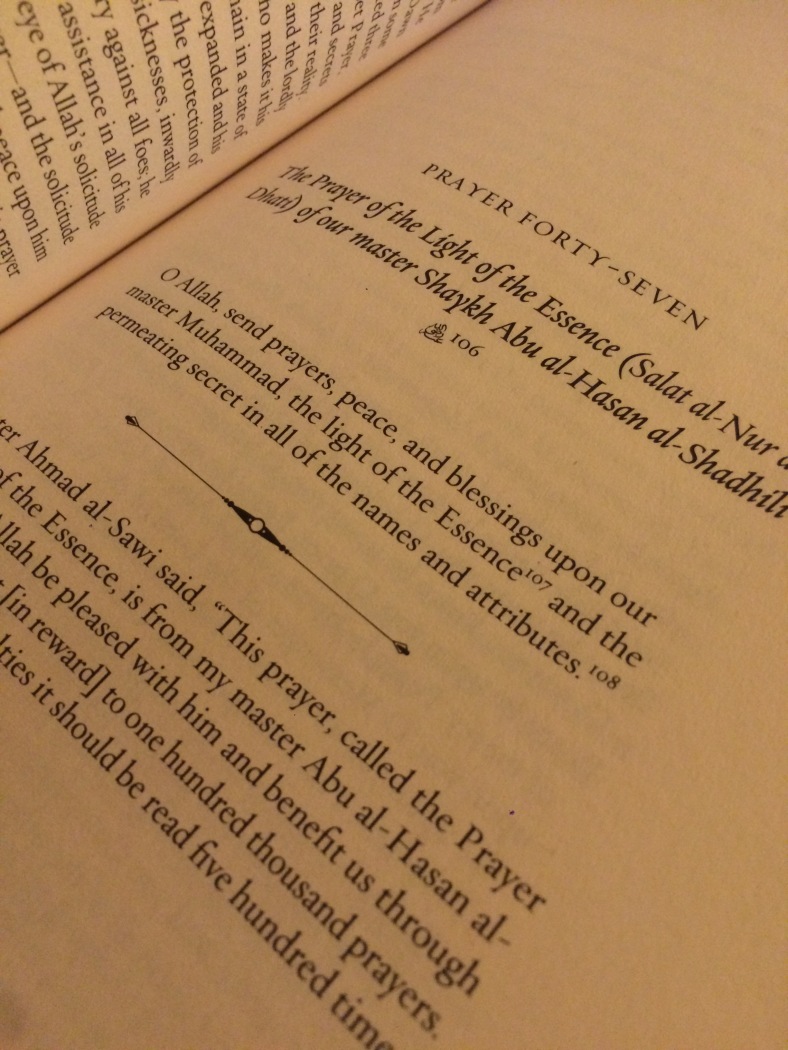Title: The Muhammadan Litanies, Prayers upon the Prophet Muhammad (peace be upon him) for Invocation and Reflection
Publisher: Ibriz Media (2016)
Author: Shaykh Yusuf al-Nabahani
Translation & Notes: Shaykh Abdul Aziz Suraqah
The Muhammadan Litanies is a unique collection of seventy prayers upon the Prophet Muhammad (peace be upon him) for daily and weekly use. Unlike other litanies, this collection can be considered an ‘annotated’ litany, as is described in the back cover:
..starting with prayers taught by the Prophet himself, followed by prayers transmitted by his Household (ahl al-Bayt) and Companions, and prayers from the early generations (Salaf) and the famous – and not so famous- saints and knowers of Allah and His Beloved. Each prayer is followed by a description of its source and its merits, and – for prayers of the gnostics – a description of the saint from whom it was taken, where the author received it or read it, and a discussion on its unique properties (khawwas), the purposes or intentions of which it can be read, and its metaphysical meanings.
Shaykh Ibrahim ibn Muhammad Hakim al-Shaghouri al-Shadhuli writes in the foreword:
Your life is short. You obviously have love for the Prophet (peace be upon him) in your heart, otherwise this compendium of prayers would not have found its way into your hands. Devote yourself to the study of these prayers upon the Beloved (peace be upon him) uttered and preserved by His accepted friends. Some of them address him (peace be upon him) with the tongue of servitude; others with the tongue of love and passional longing; others with the tongue of knowledge; others with the tongue of reverential awe; others with the tongue of seeking fulfillment of needs. Learn from them the art and etiquette of addressing the Creator and His Beloved.
As for those who are satisfied with their current state and imagine themselves without need of the likes of this book, let them heed the warning of Allah Most High in His Words, When the hypocrites come to you they say, “We bear witness that indeed you are the Messenger of Allah.” And Allah knows that you are indeed His Messenger, and Allah bears witness that the hypocrites truly are liars.”…And when it is said to them, “Come, and Allah’s Messenger will ask forgiveness for you.” They twist their heads, and you see them turning away, disdainful. (63:1,5) This is why books such as The Muhammadan Litanies are a Divine provision (rizq) specified for some and barred from others.
May Allah protect us from hypocrisy and bestow upon us the Divine favour of this great, abundant, everlasting provision. Ameen.
Shaykh Mohammed Aslam writes in his foreword (The second foreword of the book):
Every time this Umma was on the verge of being overcome by darkness of despondency and hopelessness, and the tides of despair, anguish, and pain seemed to transgress over the barriers of aspiration and relief, Allah inspired mankind with the heavenly gift of praising and sending salutations upon His chosen and most Beloved Messenger, Sayyinduna Muhammad (peace be upon him). The majesty of this favor brought life to dead souls, healed fragmented hearts, rehabilitated wounded bodies and caused his Umma to yet again be honored with the delights of triumph and ecstasy of proximity and splendor of veneration amongst the inhabitants of the heavens and the earth.
Shaykh Abdul Aziz writes in his Preface:
The Prophet Muhammad (peace be upon him) alluded to the importance of sound – in form of invocation (dhikr) – as a means of survival, sustenance, and protection from the apocalyptic strife of the latter days. After the Prophet (peace be upon him) described the extreme famine that will occur shortly before the appearance of the Anti-Christ (Dajjal) some of his Companions asked, “What will the people live on at that time?” The Prophet (peace be upon him) replied, “Utterances of La ilaha illa Allah, Allahu akbar, subhanAllah and al-hamdulillah – that will take the place of food for them.” (Ibn Majah, Sunan). We understand from this that an essential means to spiritually nourish and protect ourselves in the latter days is to adopt a daily and nightly litany consisting of recitation of the Quran, Prophetic supplications, and prayers upon the Prophet Muhammad (peace be upon him), uttered with love, yearning, awe and presences of heart.
And later in the preface:
This work is meant to be read as a daily or weekly litany, though each prayer can also be read as a standalone prayer either in unlimited number of for specific numbers.
The spiritual power of these prayers upon the Prophet (peace be upon him) is palpable to anyone who reads them just once, so how much more purifying, uplifting, and spiritually edifying they will be for the one who takes them as a regular litany through each day of the week, or adopts a few as a part of his or her daily invocations and remembrance.
And a few paragraphs later:
The best way to read The Muhammadan Litanies is as a daily litany (wird). One may either read the litanies daily, weekly, monthly or select any formula for which one feels affinity, or which is read for specific needs.
I have elected to keep the Arabic separate from the English translation. This makes it easier to read the prayers in a continuous fashion. For a complete ready in one week the suggested schedule would be as follows:
Friday: Prayers 1-25 (pp. 49-56)
Saturday: Prayers 26-43 (pp.56-65)
Sunday: Prayers 44-48 (pp. 65-71)
Monday: Prayers 49-60 (pp. 71-77)
Tuesday: Prayers 61-69 (pp.77-82)
Wednesday: first half of prayer 70 (pp. 77-82)
Thursday: second half of prayer 70 (pp.93-101)(Alternatively, one may read all of prayer 70 on Thursday, or half of it on Thursday evening before Jumu’a. This is a suggested schedule; I encourage you to find a schedule that works for you based on your own circumstances and needs.)
Given the limitations of space and the difficulties such a task would entail, I have not transliterated the prayers. I will, Allah willing, soon release an audio recording of all the prayers in this book, which can be used as an aid for proper pronunciation as well as a tool for memorization, or for simply listening to as a form of remembrance. This audio recording will be made available on my website, http://www.ibrizmedia.com
I urge you to contemplate these prayers, witness their secrets and lights unfold in your life, and let them carry you and transform you into a receptacle or Muhammadan love, yearning, Muhammadan character and concern, and Muhammadan purity.
This is a shortened biography of Shaykh Yusuf al-Nabahani extracted from the book:
He is the erudite scholar and ‘poet of the Prophet (peace and blessings be upon him)’, Shaykh Yusuf b. Isma’il b. Muhmammad Nasir al-Din al-Nabahani. Born in the village of Ijzim near Haita, Palestine in the year 1265 AH (1849 CE), Shaykh Yusuf al-Nabahani recieved a pious upbringing and learned the Quran from his father, Shaykh Ismail al-Nabahani, about whom al-Nabahani said, “My father’s daily and nightly litany consisted of reading one third of the Quran, and he would later complete the Quran three times every week – and all praise is for Allah!”
After memorizing the Quran under the instruction of his father, al-Nabahani received permission to travel to Cairo, Egypt, where in 1283 AH (1866 CE) he began his formal Islamic studies in the Great Mosque of al-Azhar and remained there until 1289 AH (1872 CE). In the year 1289 AH (1872 CE) after completing his studies at al-Azhar, Shaykh Yusuf al-Nabhani returned to his native Palestine, where in Akka he organized lessons teaching the sacred sciences and the Arabic language, and took a position one year later as an assistant judge in Jenin, where he remained until 1293 AH (1876 CE). He then moved to Constantinople, capitol of the Ottoman Caliphate, where he worked on and off for several years as an editor of the Arabic periodical al-Jawaib and proofread the Arabic works it published. He then left Constantinople for Iraq, where he settled for five months as a judge in Mosul, and soon resettled in al-Ladhiqiyya and took a position as chief judge in its criminal court. After living there and serving as judge for five years, Shaykh Yusuf al-Nabahani was transferred to Jerusalem and appointed chief judge of its criminal court, where he remained less than a year before being reassigned as chief judge of the criminal court of Beirut in 1305 AH (1888 CE). The Shaykh was to remain as chief judge in Beirut’s criminal court until he retired in 1327 AH (1909 CE). After his retirement the Shaykh wrote and published the majority of his books and spent time in the Blessed City of the Prophet (peace and blessings be upon him), Medina, returning to his native Ijzim after the start of World War I in 1914 and remaining there until he passed away in the year 1350 AH (1932 CE).
May Allah bestow His expansive mercy upon Shaykh Yusuf al-Nabahani, the paragon of Prophetic love and yearning, and join him with the Prophet (peace and blessings be upon him) on the Last Day.
Shaykh Yusuf al-Nabahani writes in his Introduction:
I pondered over my many sins and my meagre good works, and as a result my affliction intensified and my fear overcame my hope. Then Allah (glorified and Exalted is He!) inspired within me the understanding that there is no remedy for this illness except in truthful and sincere turning to the Master of the Emissaries and the Beloved of all Existence, for Allah Most High says, “Seek unto Him [Allah] a means of approach (wasila) (5:35) – and indeed, the Prophet (peace and blessings be upon him) is the greatest of intermediaries and means of approach unto Allah, and the most superior of creation and the most beloved of them in Allah’s sight. So here I am, turning resolutely to the generous Prophet (peace and blessings be upon him) and serving him with this compilation in which I have gathered the best prayers sent upon him (peace and blessings be upon him).
I have divided this work into two sections and a conclusion. In the first section I explain the general virtues and benefits of sending prayers upon the Prophet (peace and blessings be upon him). In the second section I detail the finest and most precious methods of sending prayers upon him. I relate each wording to its author or compiler and speak briefly about its narrators and virtues. Beyond providing the quotes, nothing in this work is to my own credit. I have spared to effort in choosing from the relied-upon books and authors and sourcing each statement back to the one who said it.
At the end of his introduction, the Shaykh writes:
O Muslim who loves the Prophet (peace and blessings be upon him) and yearns to send prayers upon him! Make use of this book for the rectification of your religion and your worldy life, for no matter how far and wide you search, you are unlikely to find any compilation of prayers as comprehensive as the one before you. I turn myself wholly to Allah Most High, asking Him to benefit me by this book, and to benefit by it every Muslim with a heart free of maladies and a tongue and body free of objections. Indeed, He is the Guarantor of that!
In chapter 2, Shaykh al-Nabahani includes a quote from the knower of Allah, Taj al-Din Ibn ‘Ata’illah al-Sakandari, as found in his book Taj al-‘arus al-hawl li tahdhib al-nufus:
Whosoever is nearing the end of his life and wants to recover what he missed [of righteousness] should invoke with the comprehensive formulae of remembrance. By doing that, a short life will be as if it were long. An example of this is him saying, “Glorified and transcendent is Allah, the Tremendous, and to Him is all praise – by the number of His creation, His self-pleasure, the weight of His Throne, and the ink of His words.” Likewise, whosoever has missed the chance to offer many fasts and stand frequently during the night in prayer should busy himself with invoking prayers upon the Messenger of Allah (peace and blessings be upon him). Had you performed every act of obedience during your entire life and then Allah sent a single prayer upon you, that single prayer would outweigh all of the obedience you had done during your entire life. That is because you send prayers according to your capacity, but Allah sends prayers according to his Lordship (Rububiyya). And that is if it is only a single prayer, so what do you think if He sends ten prayers upon you for every prayer you send, as is mentioned in the rigorously authenticated hadith? How excellent your life will be if you use it to obey Allah by invoking Him and sending prayers upon the Messenger of Allah (peace and blessings be upon him)!
I pray that these precious excerpts have given the prospective reader a glimpse of the contents and richness of this book. Many prayers will be very familiar for readers who have used other similar litanies, and many prayers are concealed gems waiting to be found. Prayers 48 and 49 are especially for those visiting the Messenger of Allah (ziyara), and includes salutations and prayers for the two Companions, Abu Bakr and Umar (may Allah be please with them), as well as for Uthman and Ali (may Allah be please with them), and all of the other Companions, may Allah be pleased with them all. This book is an excellent book of daily invocation and a wonderful companion on journeys to the two holy sanctuaries. May Allah bless all those who assisted in bringing this book to the hands of earnest readers, and may Allah increase Shaykh Abdul Aziz Suraqah, give him blessings in his time, perseverance in his resolve and Divine acceptance of his noble works. Ameen.


